#Jochebed
Explore tagged Tumblr posts
Text
It's missing her hours

She is everything.
I shouldn't watch SW right after finishing The Prince of Egypt. Rip to my friends that have to listen to me rant about Shmi Skywalker while listening to Jochebed's part of Deliver us and The river lullaby on repeat.
12 notes
·
View notes
Note
Character ask: Miriam and Jochebed
Okay. I hope I don't get too many more Bible character asks, because I'm honestly not religious , but here goes. I'll cover both mother and daughter together, because one of my favorite pictures of them is a painting of them both.
Favorite thing about them:
Jochebed: Her love, bravery, and cleverness in protecting her son Moses, by technically following the law ("Every Hebrew boy must be thrown into the Nile") but putting him in a water-tight basket and having her daughter watch over him until he's safely found.
Miriam: Her status as a revered female prophet, who protected her brother Moses as a child, who led the Israelites in music and dance at the Red Sea, and who earned the respect and loyalty of her people. I especially like the emphasis that modern Judaism places on her holiness and position of power.
Least favorite thing about them:
Jochebed: That she had to give up her son to save his life, the poor woman, though at least she was able to be his wet nurse.
Miriam: Her possible racism in criticizing Moses "because of his Cushite wife." Although people have tried to find a more sympathetic explanation for that passage: for example, one legend has it that Miriam and Aaron were defending Zipporah, because Moses had separated from her to live a more holy life of celibacy, not objecting to Moses having married her. At any rate, at least she's punished and humbled when God strikes her with a temporary skin disease.
Three things I have in common with them:
*I'm part Jewish.
*I have dark hair, as they must have in that time and place.
*Like Miriam with her tambourine, I believe in the spiritual power of music.
Three things I don't have in common with them:
*I've never been a slave.
*I'm not devoutly religious.
*I've never lived in Egypt.
Favorite line: From The Prince of Egypt:
Jochebed
"Hush now, my baby
Be still, love, don't cry.
Sleep as you're rocked by the stream.
Sleep and remember
My last lullaby,
So I'll be with you when you dream.
River, o river,
Flow gently for me
Such precious cargo you bear
Do you know somewhere
He can be free?
River, deliver him there"
Miriam
Singing as a child:
"Brother, you're safe now,
And safe may you stay,
For I have a prayer just for you
Grow, baby brother,
Come back someday,
Come and deliver us too"
Encouraging Moses as an adult:
"Moses, hear what I say. I have been a slave all my life. And God has never answered my prayers until now. God saved you from the river, He saved you in all your wanderings, and even now, He saves you from the wrath of Pharaoh. God will not abandon you. So don't you abandon us."
brOTP: Each other, Moses and Aaron.
OTP: For Jochebed, her husband Amram. For Miriam, her own husband, whoever he was, if she did marry (traditions vary).
nOTP: Moses or Aaron.
Random headcanon: For Jochebed, she was born very late in her father Levi's life, so even though her husband Amram was her nephew, she was younger than he was. (I hope nothing in the text contradicts this.) Of course, the very fact that Levi, son of Jacob, was her father is hard to believe, because it would have made her an impossibly elderly mother when Moses was born, even older than Sarah was at Isaac's miraculous birth. But we probably shouldn't worry about whether the timeline is realistic or not – it's innately convoluted and full of contradictions, probably because it consists of multiple sources strung together over centuries.
For Miriam, I like the Jewish legend that a well or a spring followed her throughout the desert, providing water for the Israelites, and that it dried up when she died, which explains why in the Book of Numbers there's suddenly no water after her death.
Unpopular opinion: I don't think I have one.
Song I associate with them:
For Jochebed:
"Deliver Us" from The Prince of Egypt
youtube
For Miriam:
"Miriam's Song" by Debbie Friedman
youtube
"When You Believe" from The Prince of Egypt
youtube
Favorite picture of them:
This painting of mother and daughter together with baby Moses.
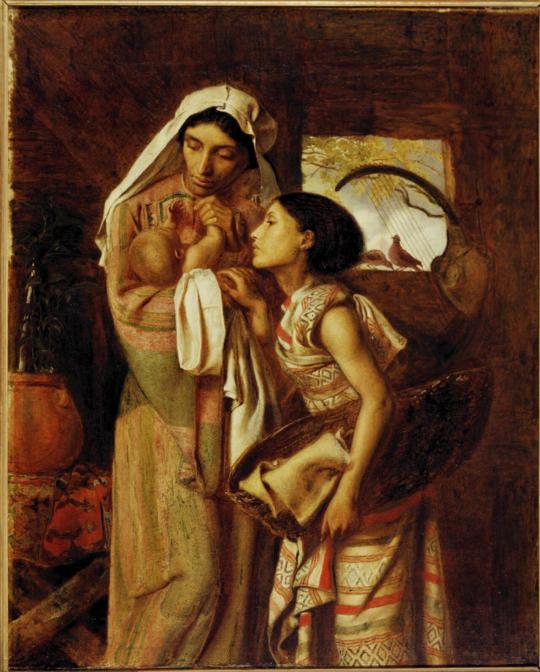
Of Jochebed:
These stills from The Prince of Egypt. (The first two also featuring little Miriam, little Aaron, and baby Moses.)
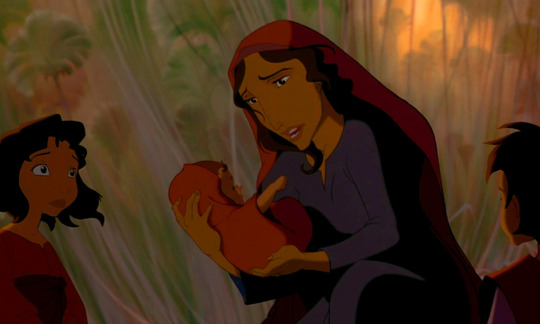


Of Miriam:
This modern painting, because unlike most paintings of Miriam at the Exodus with her tambourine, it shows her correct age. Most classic paintings of the scene make the mistake of portraying her as a young woman, but she was Moses's older sister, which means she would have been in her eighties! Please, artists, let elderly women play music and dance!
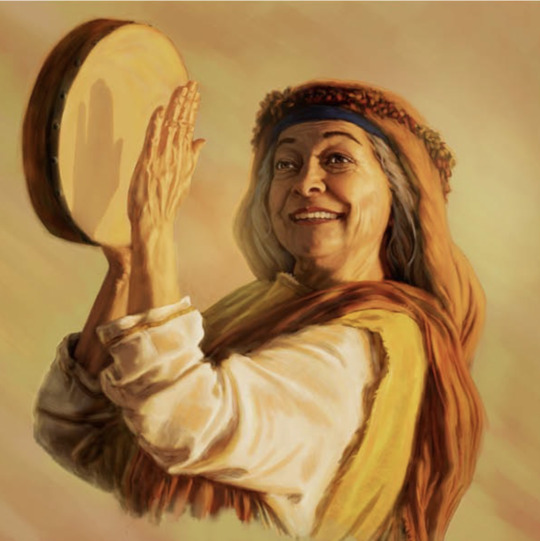
From The Prince of Egypt, as a child and as an adult. (Even though the movie does make adult Miriam younger at the Exodus than she would have been, that's okay, because it makes Moses younger too.)

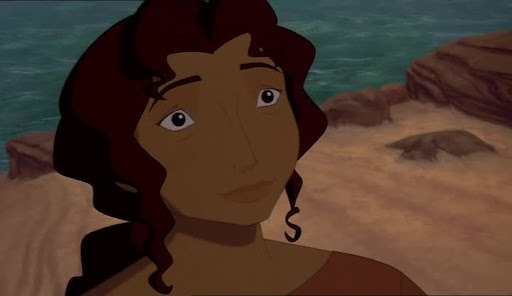
#character ask#jochebed#yocheved#miriam#the bible#hebrew bible#old testament#exodus#the prince of egypt#ask game
7 notes
·
View notes
Text

Moses and Jochebed (1884) - Pedro Américo
14 notes
·
View notes
Photo
A brave woman who is not always recognized
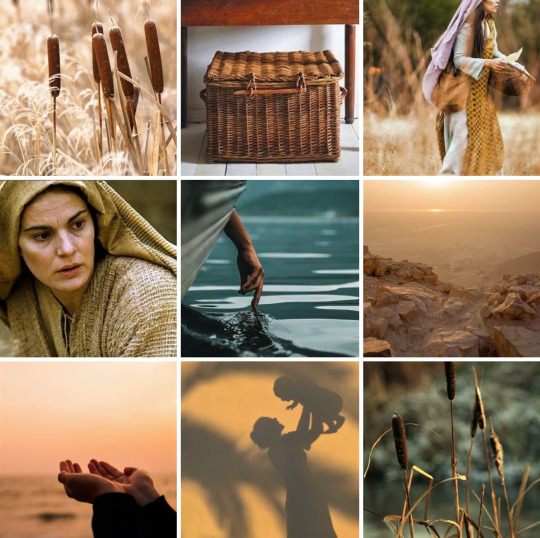
Women of the Bible Moodboards // Jochebed
When she could hide him no longer, she took for him a basket made of bulrushes and daubed it with bitumen and pitch. She put the child in it and placed it among the reeds by the river bank.
(requested by anonymous)
#jochebed#the bible#women of the bible#women of the bible moodboards#characters#character moodboards#moodboards#aesthetics#my moodboards#my edits#requests#requested moodboards#the ten commandments#the prince of egypt#christian faith#christian
80 notes
·
View notes
Text
Was listening to "Deliver Us" from Prince of Egypt and the part of the river lullaby inspired me to draw baby Moses.

#I find it hard to imagine how difficult it was for Jochebed to do this#but I admire her that she tries to save her son#like the desperation and the unsurety of his life#( I actually admire any mother who tries to save/defend their child)#prince of egypt#my art <3#my own post
5 notes
·
View notes
Text
The Faith of a Father and Mother
23 By faith Moses, when he was born, was hidden for three months by his parents, because they saw that the child was beautiful, and they were not afraid of the king’s edict. – Hebrews 11:23 ESV We read it in Exodus 1: “Now there arose a new king over Egypt, who did not know Joseph” (Exodus 1:8 ESV). Joseph was gone. Time had passed and the preferential treatment received by his family was about…
View On WordPress
#Acts#Amram and Jochebed#faith#Genesis#God#Hebrews#Hebrews 11#hope#Luke#Moses#Nile#Pharaoh#protection#salvation#trust in God
0 notes
Text
The Penguin Book of Hebrew verse (which is available to borrow on Archive.org) has a collection of poems from the 8th-11th century and became part of the Italian nusach for Simchat Torah; the last poem is this Aramaic piyut:

There's also a passage in the Zohar that talks about various women, including Yocheved
SOS JUMBLR
I'm looking for a poem or extended piece of verse about Yocheved/Moses' mother for Shiva Hamlet 2.0. Bonus points if the piece is pre-19th century. I've been searching for weeks and so far, I'm not really finding anything that works. If you've got something that's not specifically about Yocheved but does deal with a Jewish mother/matriarch, that's also good.
#idk if this is the kind of thing you're looking for (or if you've come across this already) but I think it's interesting regardless#especially since 'Jokhebed' is not a variant of her name I would've thought to look up on my own lol#her wikipedia page romanizes it as 'Jochebed' which is weird to me. I feel like I've only ever seen 'Yocheved' before this#~the more you know!🌠~#I'd look for more but I'm kinda busy and I Know I could end up spending hours on this if I don't stop now 😔
18 notes
·
View notes
Text

Pedro Américo - Moses and Jochebed (1884)
166 notes
·
View notes
Text
TANAKH SEXYWOMAN ULTIMATE POLL
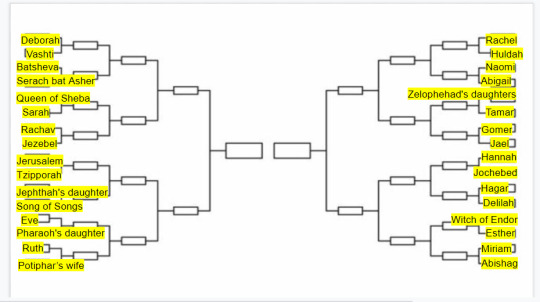
You've asked for it, so here you have it! The Tanakh Sexywoman Tumblr poll. (not affiliated with Tanakhsexyman)
-The pairings have been randomly generated.
-Sexual assault victims like Tamar bat David and Dina are not included, because it teeters on victim-blaming to call them sexy, even in jest.
Round 1:
Deborah vs. Vashti
Batsheba vs. Serah daughter of Asher
Queen of Sheba vs. Sarah
Rahab vs. Jezebel
The anthropomorphized Jerusalem in Lamentations vs. Tzipporah
Jephthah's daughter vs. Whoever Song of Songs was written about
Eve vs. Pharaoh's daughter
Ruth vs. Potiphar's wife
Rachel vs. Huldah
Naomi vs. Abigail
Zelophehad's daughters vs. Tamar
Gomer vs. Jael
Hannah vs. Jochebed
Hagar vs. Delilah
The Witch of Endor vs. Queen Esther
Miriam vs. Abishag
*The polls will go live at 9:00 AM 2/8 EST*
Happy voting!
Round Two List
Round Three List
Semifinals
261 notes
·
View notes
Text

God Promises Deliverance
1 Then the Lord said to Moses, “Now you will see what I will do to the king of Egypt. I will use my great power against him, and he will let my people go. Because of my power, he will force them out of his country.”
2 Then God said to Moses, “I am the Lord. 3 I appeared to Abraham, Isaac and Jacob by the name, God All-Powerful. But they did not know me by my name, the Lord. 4 I also made my agreement with them to give them the land of Canaan. They lived in that land, but it was not their own land. 5 Now I have heard the cries of the Israelites. The Egyptians are treating them as slaves. And I remember my agreement. 6 So tell the people of Israel that I say to them, ‘I am the Lord. I will save you from the hard work the Egyptians force you to do. I will make you free. You will not be slaves to the Egyptians. I will free you by my great power. And I will punish the Egyptians terribly. 7 I will make you my own people, and I will be your God. You will know that I am the Lord your God. I am the One who saves you from the hard work the Egyptians force you to do. 8 I will lead you to the land that I promised to Abraham, Isaac and Jacob. I will give you that land to own. I am the Lord.’”
9 So Moses told this to the people of Israel. But they would not listen to him. They were discouraged, and their slavery was hard.
10 Then the Lord said to Moses, 11 “Go tell the king of Egypt that he must let the Israelites leave his land.”
12 But Moses answered, “The Israelites will not listen to me. So surely the king will not listen to me, either. I am not a good speaker.”
13 But the Lord told Moses and Aaron to talk to the king. He commanded them to lead the Israelites out of Egypt.
Families of Israel
14 These are the leaders of the families of Israel:
Israel’s first son, Reuben, had four sons. They were Hanoch, Pallu, Hezron and Carmi. These are the family groups of Reuben.
15 Simeon’s sons were Jemuel, Jamin, Ohad, Jakin, Zohar and Shaul. Shaul was the son of a Canaanite woman. These are the family groups of Simeon.
16 Levi lived 137 years. These are the names of his sons according to their family history: Gershon, Kohath and Merari.
17 Gershon had two sons, Libni and Shimei, with their families.
18 Kohath lived 133 years. The sons of Kohath were Amram, Izhar, Hebron and Uzziel.
19 The sons of Merari were Mahli and Mushi.
These are the family groups of Levi, according to their family history.
20 Amram married his father’s sister Jochebed. Jochebed gave birth to Aaron and Moses. Amram lived 137 years.
21 Izhar’s sons were Korah, Nepheg and Zicri.
22 Uzziel’s sons were Mishael, Elzaphan and Sithri.
23 Aaron married Elisheba. She was the daughter of Amminadab and the sister of Nahshon. Elisheba gave birth to Nadab, Abihu, Eleazar and Ithamar.
24 The sons of Korah were Assir, Elkanah and Abiasaph. These are the family groups of the Korahites.
25 Eleazar son of Aaron married a daughter of Putiel. And she gave birth to Phinehas.
These are the leaders of the family groups of the Levites.
26 This was the Aaron and Moses to whom the Lord spoke. He said, “Lead my people out of Israel in their divisions.” 27 Aaron and Moses are the ones who talked to the king of Egypt. They told him to let the people of Israel leave Egypt.
God Repeats His Call to Moses
28 The Lord spoke to Moses in the land of Egypt. 29 He said, “I am the Lord. Tell the king of Egypt everything I tell you.”
30 But Moses answered, “I am not a good speaker. The king will not listen to me.” — Exodus 6 | International Children’s Bible (ICB) The Holy Bible, International Children’s Bible® Copyright© 1986, 1988, 1999, 2015 by Thomas Nelson. Cross References: Genesis 12:7; Genesis 15:18; Genesis 17:1; Genesis 17:7-8; Genesis 26:3; Genesis 35:11; Genesis 46:9-10; Exodus 1:11; Exodus 1:14; Exodus 2:1-2; Exodus 2:11; Exodus 3:10-11; Exodus 4:1; Exodus 4:10; Exodus 5:1; Exodus 6:13; Exodus 7:2; Exodus 7:4; Exodus 24:1; Leviticus 10:1; Leviticus 10:4; Numbers 3:1; Numbers 3:17-18; Numbers 3:19-20; Numbers 3:30; Numbers 16:1; Numbers 25:7; Numbers 26:11; Joshua 24:33; 1 Chronicles 4:24; 1 Chronicles 6:2; 1 Chronicles 6:17-18; 1 Chronicles 6:22-23; 1 Chronicles 6:37-38; 1 Chronicles 23:21; Isaiah 6:5; Jeremiah 1:6; Acts 13:17; Revelation 10:6
Exodus 6 Bible Commentary - Matthew Henry (concise)
Key Passages in Exodus 6
1. God renews his promise by his name JEHOVAH 9. Moses vainly attempts to encourage the Israelites 10. He and Aaron are again sent to Pharaoh 14. Genealogies of Reuben, Simeon and Levi, of whom came Moses and Aaron 26. The history resumed
#divine promise#God#deliverance#Moses#Aaron#God's people#Israel#genealogy#Exodus 6#Book of Exodus#Old Testament#ICB#International Children's Bible#Thomas Nelson
5 notes
·
View notes
Text






Manacled by senlinyu, aka the only dramoine fic I’ve ever read.
I started this fic to see what all the hype was about, not expecting to get sucked in. Surprise, I was obsessed. I told myself I wasn’t going to bind it. Surprise, a week later I was working on cover designs.
I wanted to feature women of the Bible who are often left out of Sunday school for one reason or another. Whose work is downplayed or straight up ignored. Please note: I was raised in the south, with Southern Baptist churches everywhere. So this is going on what I was taught, not exactly what I believe in ✨
Volume One features Mary Magdalene, who was a disciple of Jesus but usually not recognized as one, at least where I’m from.
Volume Two features Lilith, the first wife of Adam, who was cast out of the Garden of Eden for refusing to be subservient to him.
Volume Three features Jochebed, mother of Moses, who had to make the ultimate decision when it came to the safety of her child. Not much is mentioned about her in the Bible, other than her hiding Moses then putting him in a basket on the Nile.
These were always the women I looked up to growing up, who did what they had to do, who fought how they could, and usually didn’t get a single thank you for it.
Anyway, sounds familiar in the context of Manacled.
Typeset is by the lovely ladybobbitt on instagram, thank you so much!! Cover was designed on Canva.
Manacled, by senlinyu, is available to read for FREE on ao3. Mind the tags. Keep fanfiction free. Stop selling this, for the love of all things holy.
One more note: JK Rowling is a horrible, horrible person. This is a fanwork, that is incredibly well written. Support fanworks, not her.
8 notes
·
View notes
Text
thinking about the co-emergences of m/others and girls in the bible. jochebed and miriam, naomi and ruth, leah and dinah, gomer and lo-ruhamah. these are feminine almost-spaces. these are asymmetrical, plural, and fragmented matrixial subjects unassimilated by the text itself. miriam, made into a sign act by god, is likened to a walking miscarriage. ruth, on the threshing floor at naomi's request, evinces judges nineteen and non-con dismemberment. with dinah, the text finally offers the birth of a girl, and with lo-ruhamah, the weaning of one. but an intra-uterine split has preceded both, has preceded all
17 notes
·
View notes
Text

wow another piece titled "jochebed" thats revolutionary
17 notes
·
View notes
Text
The Prince of Egypt
Roundtable Discussion
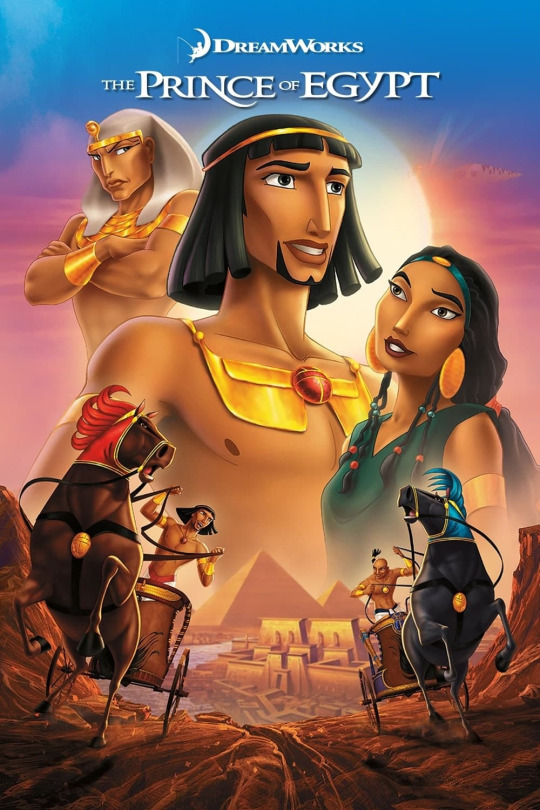
In what ways does the film’s score situate the story with its narrative context?
youtube
timestamp: (1:19)
The film’s score acts as a major storytelling device. Each song provides key information about the narrative, explores developments in characters, and can show the passage of time within the story. In “Deliver Us”, we learn about the context of the enslaved Israelites in Egypt, the order from Pharaoh to kill every newborn Hebrew boy, and Moses’ mother Jochebed’s attempt to save him from the infanticide. “The Plagues” serves a similar plot-based purpose and definitely situates the narrative within the book of Exodus while maintaining the rivalry between brothers. The film’s score uses an overture and several reprises to fully embed the songs into plot and characterize this narrative as epic.
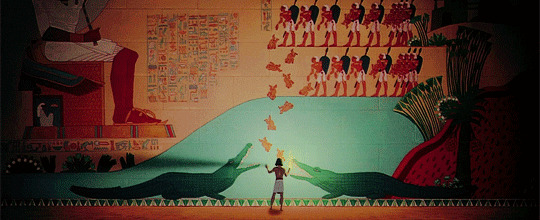
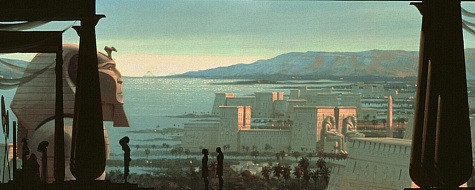
How do songs use character performance to push cultural authenticity in the film’s diegesis?
Songs include Hebrew language in their lyrics to push cultural authenticity. For example, Ofra Haza’s vocal performance in “Deliver Us” is one of the few vocal performances from a non-white person in the film. Like Armstrong notes, “Moana is not the first production for which Disney hired cultural ‘natives’ to grant cultural authority to offset criticism of imperialism”.
Haza's inclusion as the mother of Moses is a powerful and meaningful role, but she only appears at the beginning of the film. This character performance is used to push cultural authenticity as Ofra Haza is a famous Israeli singer who sings Hebrew in the song. The fact that she “stands out” is indicative of the limited casting—she is casted alongside famous, mostly white American actors.

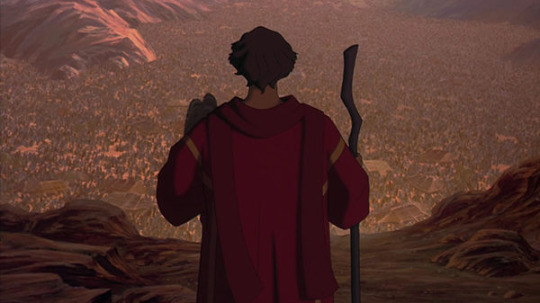
In what ways does the film use musical “framing” to structure the score within familiarized styles?
Like in Moana, musical framing is also present in The Prince of Egypt’s score, composed by Hans Zimmerman. Traditional and culturally significant instruments like the shofar (which sounds like a horn), the flute, and percussion like the Darbuk and Toft, seem to be included in the score. These "unfamiliar" instruments however are sandwiched by and interspersed with “a familiar set of ‘normal’ musical sounds” like Armstrong mentions. The score is “framed” with choir vocals, french horn, strings, and other Western instruments.

19 notes
·
View notes
Text
that scene from the prince of egypt where moses has a nightmare of him, his siblings, and his mother jochebed as hieroglyphics during the killing of the firstborn but instead with andromache and astyanax on the side of an amphora….
5 notes
·
View notes
Text
okay. Just watched Prince of Egypt for the first time. Sorry! I know, uncultured.
I am…having thoughts. Namely, why is this movie so praised? And on tumblr of all places?
interesting? Sure. Pacing? Fairly decent. Complex characters? Yeah. Two of them. Accurate to the original material? Only in its most basic form.
Regardless of my own feelings about the movie, I can’t believe that TUMBLR of all places has no issue with the serious erasure of women and disabilities in that movie! It took away Jochebed/Yokeved’s really significant role of raising Moses, teaching him about his people, making sure he didn’t forget who he was—which was only possible because of Miriam’s courage and cunning!
and the worst offender, of course, is the complete erasure of Moses’ speech impediment and Aaron’s role in helping him communicate despite it. The whole storyline of being disqualified from rule in Egypt because of it, and the God of the Hebrews saying, no, I made you just the way you are and I’m going to show them and you how perfect you are is just…thrown out? For some basic brotherly angst?
idk. It just. It wasn’t what I was expecting.
#And ramses surviving at the end? What was that?#prince of egypt#the prince of egypt#moses#aaron#Ramses#disability representation
2 notes
·
View notes